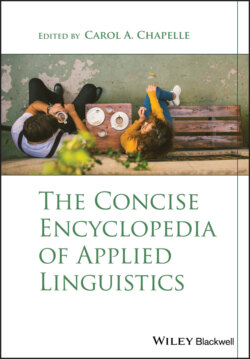Читать книгу The Concise Encyclopedia of Applied Linguistics - Carol A. Chapelle - Страница 115
Listening Processes
ОглавлениеCurrent conceptions of the listening process maintain that comprehension results from the interaction of numerous sources of information, including the acoustic input and other relevant contextual information. The mind simultaneously processes these incoming stimuli and other information such as linguistic and world knowledge already present in the mind. Listening comprehension is a dynamic process, which continues for as long as new information is made available from any of these sources (Gruba, 1999; Buck, 2001).
Listening is multidimensional but is comprised of related discrete lower‐level ability components. While agreement on a comprehensive list of these components has not been reached (nor does there exist an agreed‐upon theory of how these components operate with each other), some research indicates that listening ability may include three lower‐level abilities: the abilities to understand global information, to comprehend specific details, and to draw inferences from implicit information (Min‐Young, 2008). Test developers typically draw upon these in defining a listening construct in the first stages of test development.
